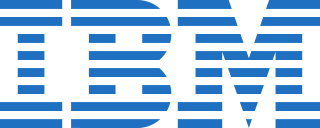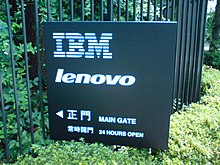
Compaq Computer Corporation was an American information technology company founded in 1982 that developed, sold, and supported computers and related products and services. Compaq produced some of the first IBM PC compatible computers, being the second company after Columbia Data Products to legally reverse engineer the BIOS of the IBM Personal Computer. It rose to become the largest supplier of PC systems during the 1990s before being overtaken by Dell in 2001. Struggling to keep up in the price wars against Dell, as well as with a risky acquisition of DEC, Compaq was acquired for US$25 billion by HP in 2002. The Compaq brand remained in use by HP for lower-end systems until 2013 when it was discontinued. Since 2013, the brand is currently licensed to third parties for use on electronics in Brazil and India.

Dell Inc. is an American technology company that develops, sells, repairs, and supports computers and related products and services. Dell is owned by its parent company, Dell Technologies.

ThinkPad is a line of business-oriented laptop computers and tablets, the early models of which were designed, developed and marketed by International Business Machines (IBM) starting in 1992. IBM sold its PC business, including laptops to Lenovo in 2005, and since 2007, all new ThinkPad models have been branded Lenovo instead. The Chinese manufacturer further developed the line, and is still selling new models in 2024.
Packard Bell Electronics, Inc. was an American computer company independently active from 1986 to 1996, now a Dutch-registered computer manufacturing brand and subsidiary of Acer Inc. The company was founded in 1986, after Israeli-American investors bought the trademark rights to the Packard Bell Corporation from Teledyne. The investors wanted to name their newly formed personal computer manufacturing company producing discount computers in the North American markets.

Columbia Data Products, Inc. (CDP) is a company which produced the first legally reverse-engineered IBM PC clones. It faltered in that market after only a few years, and later reinvented itself as a software development company.

Dell EMC is an American multinational corporation headquartered in Hopkinton, Massachusetts, and Round Rock, Texas, United States. Dell EMC sells data storage, information security, virtualization, analytics, cloud computing and other products and services that enable organizations to store, manage, protect, and analyze data. Dell EMC's target markets include large companies and small- and medium-sized businesses across various vertical markets. The company's stock was added to the New York Stock Exchange on April 6, 1986, and was also listed on the S&P 500 index.

Gateway, Inc., previously Gateway 2000, Inc., was an American computer company originally based in Iowa and South Dakota. Founded by Ted Waitt and Mike Hammond in 1985, the company developed, manufactured, supported, and marketed a wide range of personal computers, computer monitors, servers, and computer accessories. At its peak in the year 2000, the company employed nearly 25,000 worldwide. Following a seven-year-long slump, punctuated by the acquisition of rival computer manufacturer eMachines in 2004 and massive consolidation of the company's various divisions in an attempt to curb losses and regain market share, Gateway was acquired by Taiwanese hardware and electronics corporation Acer, in October 2007 for US$710 million.

Iomega Corporation was a company that produced external, portable, and networked data storage products. Established in the 1980s in Roy, Utah, United States, Iomega sold more than 410 million digital storage drives and disks, including the Zip drive floppy disk system. Formerly a public company, it was acquired by EMC Corporation in 2008, and then by Lenovo, which rebranded the product line as LenovoEMC, until discontinuation in 2018.

Louis Vincent Gerstner Jr. is an American businessman, best known for his tenure as chairman of the board and chief executive officer of IBM from April 1993 until 2002, when he retired as CEO in March and chairman in December. He is largely credited with turning IBM's fortunes around.

Lenovo Group Limited, trading as Lenovo, is a Chinese-American multinational technology company specializing in designing, manufacturing, and marketing consumer electronics, personal computers, software, business solutions, and related services. Products manufactured by the company include desktop computers, laptops, tablet computers, smartphones, workstations, servers, supercomputers, data storage devices, IT management software, and smart televisions. Its best-known brands include its ThinkPad business line of laptop computers, the IdeaPad, Yoga, LOQ, and Legion consumer lines of laptop computers, and the IdeaCentre, LOQ, Legion, and ThinkCentre lines of desktop computers. As of 2024, Lenovo is the world's largest personal computer vendor by unit sales.

AST Research, Inc., later doing business as AST Computer, was a personal computer manufacturer. It was founded in 1980 in Irvine, California, by Albert Wong, Safi Qureshey, and Thomas Yuen, as an initialism of their first names. In the 1980s, AST designed add-on expansion cards, and evolved toward the 1990s into a major personal computer manufacturer. AST was acquired by Samsung Electronics in 1997 but was de facto closed in 1999 due to a series of losses.

PC Magazine is an American computer magazine published by Ziff Davis. A print edition was published from 1982 to January 2009. Publication of online editions started in late 1994 and continues as of 2024.

SK hynix Inc. is a South Korean supplier of dynamic random-access memory (DRAM) chips and flash memory chips. Hynix is the world's second-largest memory chipmaker and the world's sixth largest semiconductor company. Founded as Hyundai Electronic Industrial Co., Ltd. in 1983 and known as Hyundai Electronics, the company has manufacturing sites in Korea, the United States, mainland China and Taiwan. In 2012, when SK Telecom became its major shareholder, Hynix merged with SK Group.

William J. "Bill" Amelio is an American business executive who was the CEO of Lenovo. He was also the CEO of Avnet.
International Business Machines (IBM) is a multinational corporation specializing in computer technology and information technology consulting. Headquartered in Armonk, New York, the company originated from the amalgamation of various enterprises dedicated to automating routine business transactions, notably pioneering punched card-based data tabulating machines and time clocks. In 1911, these entities were unified under the umbrella of the Computing-Tabulating-Recording Company (CTR).

Liu Chuanzhi is a Chinese entrepreneur. Liu is the founder of Lenovo, the world's largest personal computer vendor by unit sales. He remains one of the leaders of the company.

International Business Machines Corporation, nicknamed Big Blue, is an American multinational technology company headquartered in Armonk, New York and present in over 175 countries. IBM is the largest industrial research organization in the world, with 19 research facilities across a dozen countries, having held the record for most annual U.S. patents generated by a business for 29 consecutive years from 1993 to 2021.
The IBM ThinkPad 500 is a subnotebook from the ThinkPad series released by IBM in 1993.

TriGem Computer Co., Ltd., was a South Korean personal computer manufacturer and technology company. Established in 1980, TriGem was the first Korean company dedicated to manufacturing computer systems. It delivered Korea's first microcomputer in 1981 and the first Korean IBM PC compatibles in 1984. From that point until its breakup in 2010, it alternated between the first- and second-largest computer manufacturer in South Korea, competing with Samsung Electronics.
















